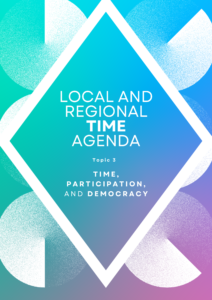Time, participation, and democracy
Local and Regional Time Agenda

Time and civic involvement determine the cadence of democratic participation. A democratic society thrives on active citizens, who need time to understand issues, engage in conversations, and contribute with ideas. This temporal component is subject to complex dynamics that can either foster or hinder involvement.
At the heart of democratic citizenship lies the implicit right to time — an inherent right premised on the idea that individuals deserve the temporal freedom to engage in civic life without compromising personal responsibilities and well-being. Ensuring this right, and that every citizen has the temporal resources necessary to participate, is key to an inclusive democracy. However, time continues to be distributed unevenly. A closer look at the most time-deprived segments of society reveals a grim reality. The engagement of women, who often bear domestic and caregiving burdens unequally, is limited. Similarly, people from lower socio-economic backgrounds who grapple with economic pressures experience time scarcity, which impedes their participation.
This Agenda provides time policies to inspire local and regional governments seeking to better place time as an essential element for democracy. It gives visibility to implementable practices from various realities, from big cities to rural areas, and includes metropolitan and regional dimensions.




